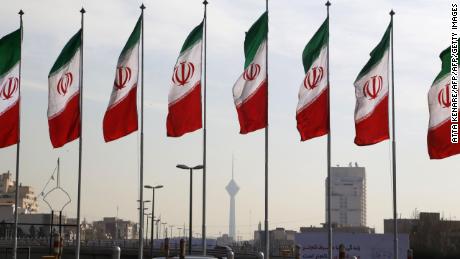Assassinated Iranian nuclear scientist shot with remote-controlled machine gun, news agency says
(CNN)The Iranian nuclear scientist assassinated Friday east of Tehran was shot by a remote-controlled machine gun operating out of another car, the semi-official Fars News Agency said Sunday.
With top Iranian officials blaming Israel, Supreme Leader Ayatollah Seyyed Ali Khamenei and others have promised revenge for the killing of Mohsen Fakhrizadeh, who was the country's chief nuclear scientist..
There were conflicting accounts from Iranian news agencies about how the attack unfolded.
One report published Sunday from Fars News said Fakhrizadeh was traveling with his wife Friday in a bulletproof car, alongside three security personnel vehicles, when he heard what sounded like bullets hitting a vehicle, and he exited the car to determine what had happened.
When he exited the vehicle, a remote-controlled machine gun opened fire from a Nissan stopped about 150 meters (164 yards) from Fakhrizadeh's car, Fars News said.
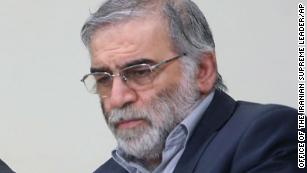
Mohsen Fakhrizadeh, in 2019.
Fakhrizadeh was hit at least three times, according to Fars News. His bodyguard was also shot. Following the gunfire, the Nissan exploded, Fars News reported, adding the attack lasted three minutes.
CNN cannot independently confirm the news agency's version of events.
The semi-official Iranian Students News Agency (ISNA) also reported Fakhrizadeh's car was hit by gunfire, followed by an explosion and more gunfire, citing Iranian Defense Minister Brig. Gen. Amir Hatami.
"Based on reports received from members of his security detail, Mr. Fakhrizadeh's vehicle was initially targeted by gunfire, after which a Nissan vehicle laden with explosives was set off in close proximity to them as gunfire, targeting their vehicle, was continuing," Hatami said, according to ISNA.
IRIB, Iranian state television, said the explosion happened first, followed by gunfire from attackers.
Seyed Kamal Kharrazi, the head of Iran's Strategic Council on Foreign Relations, compared the assassination to the killing of Qasem Soleimani, the state-run Islamic Republic News Agency reported Sunday. Soleimani, the leader of the Islamic Revolutionary Guards Corps' Quds Force, was killed in a US drone strike earlier this year in Iraq.
"Undoubtedly, the Islamic Republic of Iran will give a calculated and decisive answer to the criminals who took Martyr Fakhrizadeh," Kharrazi was quoted as saying.
Fakhrizadeh was the head of the research center of new technology in the elite Revolutionary Guards and was a leading figure in Iran's nuclear program.
Iranian leaders blame Israel
Supreme Leader Khameini wrote Saturday on a Twitter account that often carries his official statments, "Mr Mohsen Fakhrizadeh was killed by the oppressive enemies. This rare scientific mind lost his life for his everlasting great scientific work. He lost his life for God and the supreme leader."
Iranian Foreign Minister Mohammad Javad Zarif called on the international community "to end their shameful double standards" and "condemn this act of state terror." He added that the attack showed "serious indications of Israeli role."
Maj. Gen. Hossein Dehghan, Khamenei's military adviser, tweeted Saturday that "Zionists" are seeking to create "all-out war" and vowed to "descend like lightning" on Fakhrizadeh's killers.
President Hassan Rouhani, also among the many Iranian leaders blaming Israel, promised retaliation as well, saying during a cabinet meeting Saturday, "The think tanks and the enemies of Iran must know that the Iranian nation and the officials in charge in the country are brave and determined to respond to the murder in time."
The killing, he said, was carried out at "the filthy hands of oppressors, in concert with the illegitimate Zionist regime."
Iran has provided no evidence of Israeli involvement. Israeli Prime Minister Benjamin Netanyahu's office declined to comment to CNN on Friday.
Israeli Settlement Affairs Minister Tzachi Hanegbi told Israel's Channel 12 news he had "no idea" who killed Fakhrizadeh, but called it "very embarrassing for Iran."
The US State Department and International Atomic Energy Agency have said in multiple reports that Fakhrizadeh held deep insight into the Islamic Republic's nuclear capabilities. In 2018, Netanyahu said Fakhrizadeh was the head of Project Amad, which he and others describe as a secret nuclear weapons endeavor.
"Remember that name, Fakhrizadeh," the prime minister told reporters at the time.
Protests erupt in Tehran
The killing threatens to compound tensions in Tehran-Washington relations, which have deteriorated under US President Donald Trump. In 2018, Trump pulled out of a multilateral nuclear deal with Iran, and Iran began withdrawing its commitments from the 2015 Joint Comprehensive Plan of Action last year. Trump has invoked crippling economic sanctions on the country.
The White House is closely monitoring Fakhrizadeh's killing, it said. On Friday, Trump retweeted Israeli journalist Yossi Melman, who wrote that Fakhrizadeh "was head of Iran's secret military program and wanted for many years by Mossad," Israel's foreign intelligence agency.
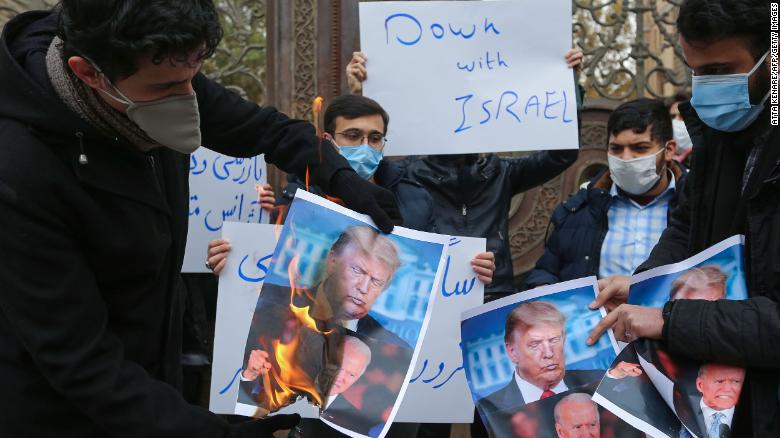
Students protest outside the Foreign Ministry in Tehran on Saturday.
Students and young Iranians have converged on several government buildings in Tehran, and at one demonstration outside the Foreign Ministry on Saturday, protesters burned US and Israeli flags and posters depicting Trump and President-elect Joe Biden.
The European Union condemned the killing and called for "maximum restraint," while the United Kingdom's Foreign Office said it was "urgently trying to establish the facts."
The funeral and burial of Fakhrizadeh will be held Monday, Fars News reported. Fakhrizadeh's remains were taken to the shrine of Imam Reza, one of the most important religious hubs for Shias, in Mashhad on Saturday. Following a Sunday service in Mashhad, his body was to be taken to Tehran to the tomb of Ayatollah Khomeini, the Islamic republic's founder.
CNN's Ramin Mostaghim, Angela Dewan and Samantha Beech contributed to this report.
Killing of top Iranian nuclear scientist: Reported versions change from 12-person commando squad to REMOTE-CONTROLLED machine gun
29 Nov, 2020 20:20
Get short URL
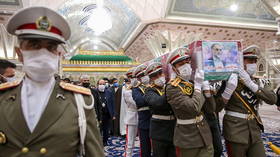
Iranian forces carry the coffin of assassinated scientist Mohsen Fakhrizadeh at the Imam Khomeini's Shrine in Tehran on Sunday. © Reuters / WANA News Agency
Iran's top scientist was assassinated with a remote-controlled machine gun from 150 meters away, semi-official news agency Fars said, contradicting previous detailed reports of a 12-person commando team doing the killing.
Citing “new details” obtained by its journalists from unidentified sources, Fars said on Sunday that the lead security vehicle in scientist Mohsen Fakhrizadeh's three-vehicle convoy of bulletproof cars left its escort position to prepare the arrival location in Absard, east of Tehran.
Just then, the car carrying Fakhrizadeh and his wife was hit by bullets. He got out of the vehicle, thinking the sound was caused by an accident, engine trouble or an obstacle. A remote-controlled machine gun mounted on a Nissan car 150 meters away then fired at the scientist, hitting him twice in the side and once in the back, severing his spinal cord.
A bodyguard who tried to protect Fakhrizadeh was subsequently shot several times. The Nissan then blew up. Fars said the assassins deployed no live agents at the scene of Friday's attack, which lasted about three minutes. The unidentified owner of the Nissan left the country, Fars said, without identifying the destination.
Iran warns US & Israel against any ‘adventurism’ during Trump’s ‘final’ days in office after murder of scientist — letter to UN
The latest description of the ambush contradicts previous reports by Fars and other news outlets. The new details were reported only in Persian at the time this article was published.
Earlier Sunday, Mohamad Ahwaze, an Iranian journalist based in London, said the attack was carried out by a dozen operatives who sprung upon Fakhrizadeh's convoy in a roundabout at the entrance to Absard. The attackers, who had the skills of “special forces in advanced armies,” reportedly were backed by a 50-person logistics team that infiltrated Iranian security services and carried out such tasks as cutting off electricity to the area 30 minutes before the ambush to slow any response to the assassination.
Ahwaze cited leaks from Iranian government officials and the elite Revolutionary Guard for details of the attack, including the fact that the hit squad knew when and where Fakhrizadeh would be. The attackers rode in a Hyundai Santa Fe and on four motorcycles. After the car in front of Fakhrizadeh's vehicle passed, the attackers blew up a Nissan to block the vehicle behind him. They then opened fire at Fakhrizadeh's car and the security vehicle in front of him.
The leader of the hit team took Fakhrizadeh out of his car and shot him dead. All of the commandos escaped the scene without injury or capture.
Meanwhile, Fars itself posted another article on Sunday, shown on the news agency's English-language website, saying “eyewitness accounts” confirmed that Fakhrizadeh was attacked by “terrorists who sprayed bullets at his car.”
Iran’s Mohsen Fakhrizadeh killed by 62-person hit squad, reports say
By Lee Brown
November 29, 2020

Iranian nuclear scientist Mohsen FakhrizadehOffice of the Iranian Supreme Leader via AP
The assassination of Iranian nuclear scientist Mohsen Fakhrizadeh was carried out by a highly trained hit squad of 62 people — pouncing in six vehicles after the local power supply was cut, according to local reports.
The killers — who Iranian officials have insisted were sent by Israel — included a team of 50 giving “logistical support” to the dirty dozen who carried out the actual ambush Friday, sources told leading Iranian journalist Mohamad Ahwaze.
All involved had “entered special training courses, as well as security and intelligence services abroad,” Ahwaze tweeted, as translated by ELINT News.
“The team knew exactly the date and course of the movement of the Fakhrizadeh protection convoy in the smallest details,” Ahwaze’s sources told him, allowing them to cut the scientist off as he went to his private villa in Absard.
Shortly before Fakhrizadeh drove through their ambush site, the team “cut off the electricity completely from this area” to slow reports of their assassination and any calls for help, the reporter said.
Fakhrizadeh was traveling in the middle of three bulletproof cars, with the killers striking after the first car entered a roundabout, the report said.
A booby-trapped Nissan was then detonated to block the car behind Fakhrizadeh — as 12 gunmen pounced on him, arriving in a Hyundai Santa Fe and four motorbikes, Ahwaze tweeted.
“After the car bomb was detonated, 12 operatives opened fire towards Fakhrizadeh’s car and the first protection vehicle,” his thread said.
“According to Iranian leaks, the leader of the assassination team took Fakhrizadeh out of his car and shot him and made sure he was killed.”
None of the hit squad were wounded or arrested during the gunbattle with the Iranian’s bodyguards, Ahwaze said.
Friday’s hit has dramatically escalated tensions between Iran and Israel, which was quickly accused of ordering the hit.
Iran’s Supreme Leader Ayatollah Ali Khamenei vowed “definitive punishment of the perpetrators and those who ordered it.”
He called Fakhrizadeh “the country’s prominent and distinguished nuclear and defensive scientist,” and analysts have compared him to being on a par with Robert Oppenheimer, the scientist who led the U.S.′ Manhattan Project in World War II that created the atom bomb.
A hard-line Iranian newspaper ran an opinion peice Sunday that urged Iran to attack the Israeli port city of Haifa in the hopes of causing “heavy human casualties” in retaliation.
Such a deadly strike “will definitely lead to deterrence, because the United States and the Israeli regime and its agents are by no means ready to take part in a war and a military confrontation,” Iranian analyst Sadollah Zarei wrote in Kayhan, a paper whose editor-in-chief has been described as an adviser to Khamenei.
The Iranian parliament also held a closed-door hearing about Fakhrizadeh’s killing on Sunday, with lawmakers chanting“Death to America!” and “Death to Israel!”
Afterward, parliament speaker Mohammad Baqer Ghalibaf told Iranian state radio that there would be harsh retaliation because “the criminal enemy does not regret it except with a strong reaction.”
In response, Israel put its embassies around the world on high alert on after Iranian threats of retaliation following the killing of a nuclear scientist near Tehran, Israeli N12 news reported.
UN nuclear inspectors have said Fakhrizadeh’s military nuclear program was disbanded in 2003. But Israeli suspicion of Tehran’s atomic program and his involvement has never ceased.
Amos Yadlin, a one-time head of Israeli military intelligence who now serves as the director of Tel Aviv University’s Institute for National Security Studies, alleged Fakhrizadeh ran “all covert activities with weaponization of the program.”
The damage of his death “cannot be measured since nobody knows exactly the scope and the depth what the Iranians are doing covertly,” Yadlin said. “But no doubt that he was the core source of authority, knowledge and organization of this program.”
Israel, suspected of killing Iranian nuclear scientists over the past decade, has not commented on the brazen slaying of Mohsen Fakhrizadeh.
Israel’s cabinet minister Tzachi Hanegbi insisted he had “no clue” who was behind it. “It’s not that my lips are sealed because I’m being responsible, I really have no clue,” Hanegbi, a confidant of Prime Minister Benjamin Netanyahu, told N12’s Meet the Press, according to YNet.
Israel also is widely believed to have its own nuclear weapons, a stockpile it neither confirms nor denies possessing.
With Post wires
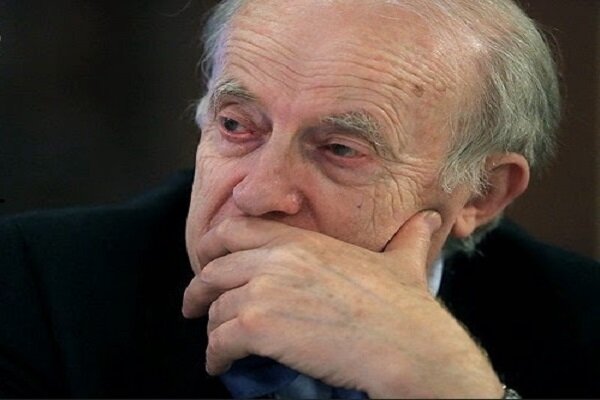
TEHRAN, Nov. 30 (MNA) – A British scholar believes that the assassination of Iranian Scientist, Mohsen Fakhrizadeh was carried out by Israel in full coordination with the United States and Saudi Arabia.
Professor Rodney Shakespeare, a renowned political commentator and visiting professor of binary economics at Trisakti University, believes that the assassination of Iranian Scientist, Mohsen Fakhrizadeh was carried out by the Israeli regime in full coordination with the United States and Saudi Arabia.
“European hypocrisy is sickening. All the time Europe shows creepy-crawly sycophancy to Israel and a complete unwillingness to ever stand up to the outrageous bullying of the USA,” noted Rodney Shakespeare, who is a co-founder of the Global Justice Movement.
The following is the full text of the interview:
Mohsen Fakhrizadeh, a senior Iranian expert specialized in nuclear technology was assassinated in a terrorist attack on Friday afternoon. What is your take on this?
This cowardly assassination was done by Israel. Occupying and annexing the land of others whilst carrying out a creeping genocide in Gaza.
Israel has always wanted a war; Saudi Arabia has always wanted a war; and Trump has always wanted a war. But they lack an excuse for starting one. So a dirty, slimy killing is done in order to goad Iran into a response which could then be used to justify an attack.
If there is no response from Iran then it is certain that there will be some sort of (Mossad-organised) false flag incident for which Iran will be blamed thereby enabling Israel, Saudi and the USA to attack Iran.
However, it is also certain that neither Israel nor Saudi Arabia (two bully-boy regimes) will attack Iran by themselves – they will want to be sure that the USA is also involved.
At present, only one thing restrains an attack on Iran and that is the certainty that, if it happens, a large past of West Asia (particularly America’s brutal, autocratic allies) will go up in flames.
Israeli media had announced that the plan for the assassination had failed last year. They also claimed that the name of Fakhrizadeh had been released to Israeli spy agency Mossad by the United Nations. What do you think?
Israel did it; Saudi connived at it -- and Trump is delighted. He wants war so that he can pose as a Great President who (allegedly) is keeping America safe and so have an excuse to remain in the White House.
(NB. Trump’s legal campaign to overthrow the recent American election has a great weakness – lack of time to actually get the evidence particularly in relation to the Dominion computers. A war would give him more time to fight the legal cases.)
Iran calls on the international community - especially EU- to end their shameful double standards & condemn this act of state terror. How do you think the international community should react to this crime?
European hypocrisy is sickening. All the time Europe shows creepy-crawly sycophancy to Israel and a complete unwillingness to ever stand up to the outrageous bullying of the USA.
What appropriate response do you think Iran should make?
My feeling is that Israel and Saudi see the situation as their last chance for a war so, even if Iran makes no open response, they will still be bent on precipitating a war in some way.
Interview by Amir Muhammad Esmaeili























